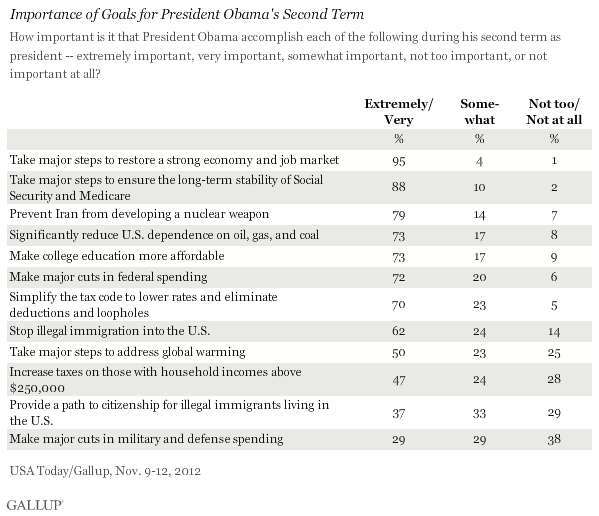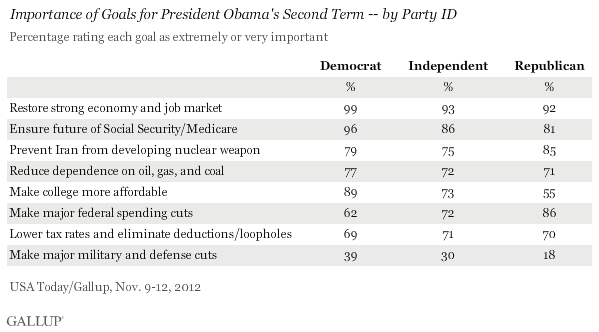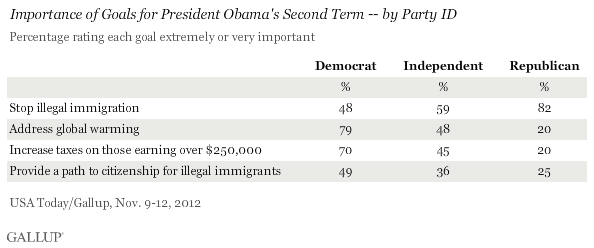PRINCETON, NJ -- Americans are very clear on what President Barack Obama's top priority should be in his second term. Restoring a strong economy and job market ranks No. 1 out of a list of 12 issues, with more than nine in 10 Americans saying it is extremely or very important that Obama take major steps to make this happen. Additionally, more than three-quarters attach high importance to his ensuring the long-term stability of Social Security and Medicare, and preventing Iran from developing a nuclear weapon.

Solid majorities of Americans in the Nov. 9-12 USA Today/Gallup poll also put heavy emphasis on significantly reducing the United States' dependence on fossil fuels, making college education more affordable, making major cuts in federal spending, and simplifying the tax code by lowering rates and eliminating deductions and loopholes.
Not only do at least seven in 10 Americans rate all of these goals as extremely or very important, but majorities of Republicans as well as Democrats agree on their importance. In other words, there is bipartisan consensus that these goals are important.
On the reverse side of things, relatively few Americans, including fewer than four in 10 Republicans or Democrats, consider making major cuts to military and defense spending a high priority for Obama.

Surtaxing the Rich and Global Warming Are Most Divisive
All will not be so easy for President Obama to navigate, however, as is evident in the broad partisan disagreement seen on two issues in particular -- raising taxes on the wealthy and addressing global warming. At least seven in 10 Democrats consider each of these highly important for Obama to do, but that contrasts with 20% of Republicans and slightly less than half of independents.
The poll also finds a significant partisan gap in ratings of immigration priorities. By 82% to 48%, Republicans are much more likely than Democrats to say that stopping illegal immigration should be a top priority. However, by a smaller 49% to 25% margin, Democrats are more likely to say providing a path to citizenship for illegal U.S. immigrants should be a top priority.

Implications
Since the election, political observers have debated about whether President Obama has a mandate to advance some of the more liberal policies he championed during the campaign or that failed to pass in his first term. Republican vice presidential candidate Paul Ryan has flat-out stated that Obama has no such mandate by virtue of the re-election of a Republican House majority. Fortunately, the importance Americans attach to various policy proposals brings some clarity to the matter.
From these data, Obama appears to have less of a mandate than an assignment: fix the economy. It's undoubtedly the same assignment that would have faced Mitt Romney had he won the election, and will likely deflate the importance Americans attach to other priorities -- such as cutting federal spending or confronting Iran -- if those appear to seriously conflict with economic growth. Similarly, the next two most highly rated priorities -- safeguarding Social Security and Medicare, and preventing a nuclear Iran -- are ones that both presidential candidates supported in the campaign. The political battles fought on these goals will be over how, not whether, to accomplish them.
Further down the list, solid majorities of Americans attach high importance to reducing U.S. dependence on fossil fuels and making a college education more affordable, which are principles that may guide much of Obama's energy and education policies in the coming years.
A key proposal from Obama's first term -- and one he brought up again in his acceptance speech last week -- is raising taxes on Americans earning more than $250,000 a year. While less than half of Americans consider this a highly important goal, another 24% call it somewhat important, indicating the public may not resist it. However, a much larger proportion is in favor of tax reform that lowers tax rates and eliminates deductions and loopholes -- more along the lines of what Romney was proposing. The partisan lines are deeply drawn on these issues, possibly foreshadowing another epic budget battle in Washington.
Obama is also expected to make good on long-standing promises to push Congress to pass comprehensive immigration reform. The weight of public opinion on immigration policy more closely favors the Republicans' emphasis on halting illegal immigration than the Democrats' emphasis on creating a path to citizenship for existing illegals. However, insofar as the goals aren't incompatible, and large majorities at least somewhat favor each of them, a comprehensive plan that achieves both may be possible.
Survey Methods
Results for this USA Today/Gallup poll are based on telephone interviews conducted Nov. 9-12, 2012, with a random sample of 1,009 adults, aged 18 and older, living in all 50 U.S. states and the District of Columbia.
For results based on the total sample of national adults, one can say with 95% confidence that the maximum margin of sampling error is ±4 percentage points.
Interviews are conducted with respondents on landline telephones and cellular phones, with interviews conducted in Spanish for respondents who are primarily Spanish-speaking. Each sample includes a minimum quota of 400 cellphone respondents and 600 landline respondents per 1,000 national adults, with additional minimum quotas among landline respondents by region. Landline telephone numbers are chosen at random among listed telephone numbers. Cellphone numbers are selected using random-digit-dial methods. Landline respondents are chosen at random within each household on the basis of which member had the most recent birthday.
Samples are weighted by gender, age, race, Hispanic ethnicity, education, region, adults in the household, population density, and phone status (cellphone only/landline only/both, cellphone mostly, and having an unlisted landline number). Demographic weighting targets are based on the March 2011 Current Population Survey figures for the aged 18 and older population living in U.S. All reported margins of sampling error include the computed design effects for weighting.
In addition to sampling error, question wording and practical difficulties in conducting surveys can introduce error or bias into the findings of public opinion polls.
View methodology, full question results, and trend data.
For more details on Gallup's polling methodology, visit www.gallup.com.
